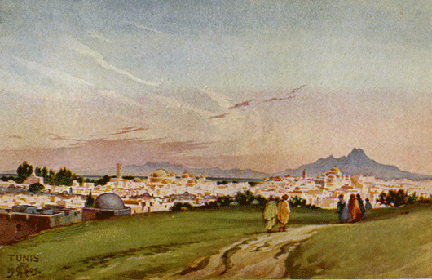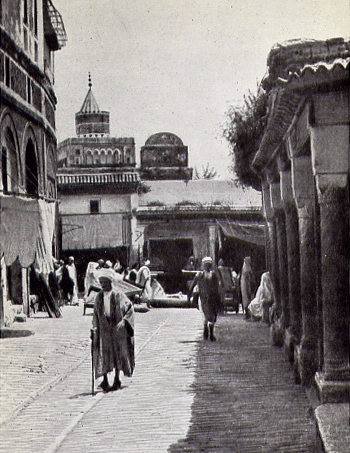
Thousands of English and American travelers have written about their experiences in the Arab World. Quite a few are worth reading, but the majority deserve obscurity. In a recent book sale at my university library, a pitiful travel account of the roaring 20s was remaindered. It bodes well for my institution that it was never checked out, although I wonder how it entered the stacks in the first place. The book in question is By the Waters of Carthage, by Norma Octavia Lorimer, following on her By the Rivers of Sicily and By the Rivers of Egypt. Why she never set sail down the Tigris by the reggae-beloved rivers of Babylon is anyone’s guess. This baneful little volume about a fickle English lady set loose in Tunis represents just about everything wrong with Orientalist inferiorizing of cultures in the Middle East. The only redeeming features are the colorful frontispiece (shown above) and black-and-white photographs of life in Tunisia around 1920.
Sometimes it is useful to read bad text in order to appreciate good travel writing all the more. There is probably no bias that does not surface in Lorimer’s diary-prone prose, all the more chauvanized by her style of filling her chapters with letters to her dear husband. Consider the following tidbits…

Market of the Dar-El-Bey in the Bazaar at Tunis.
“MY DEAR HUSBAND,
The first glimpse of these muffled and veiled women makes me thank God for my Christian husband, who not only admits that his wife has a soul, but allows her to possess it in liberty, fraternity, and equality with his own…But how I do get away from the point. I was trying to tell you of our landing, which was the orientalest thing imaginable, but the Angry Saxon got in the way. When we had lost sight of the flamingos and had taken as long as a ship could possibly take to crawl up the channel, we were by slow degrees moored to the landing-stage. It seemed to me that the ship would be stormed and every one of us devoured by the army of gesticulating, yelling, brown-skinned Orientals, who were hailing our approach with glittering eyes and outstretched arms. Why do the docks of all countries, I wonder, collect the offal of humanity? During the rest of the day here I have not seen anyone of the least resembling these desperate wretches who gave us our first welcome.
I was just a little appalled at the idea of landing in what seemed to me the very heart of the Orient without you, and for one moment, I wondered if I had done a foolhardy thing to come.
In that sea of faces there were Nubians as black as coal, and their paler brethren the Berbers, in brown and white jebbas or white French shirts let loose over wide white drawers, their limbs as skinny and withered as the grey stumps of ancient prickly-pears; Arabs with their effeminate fineness of feature, fallen to such low estate that they are actually driven to doing hard work and forced to hagle and fight like no true children of Allah for the baggage of unbelievers; Jews, of every cast of ugliness, yet all bearing the unmistakable hall-mark of their marvelous race; Maltese and Sicilians, the most despicable and only unpicturesque figures in the crowd.
What an introduction to the orient, that mass of mahogany-toned blackguards! But the colour! That was the surprise and joy of it. the black and blue and orange turbans, the crimson sashes, the flowing green robes, the exquisite blues of the better-off Jews; the gay yellow and crimson slippers, the faded and tattered browns and the pale flesh-tints of fine cloths which had long since lost their original splendour; and, what was best of all, the biblical-looking figures of the bearded and burnoused Arabs, in their fine white turbans, standing a little distance off, looking on at the eager, starving dock loafers. As I watched them, I wondered if I should make anything of it during my short visit here — if I should even be able to peep behind the veil which separates the East from the West. Everything is of course a terrible jumble; it seems as it if would take years to disentangle races, customs, grades, habits, types. Colour, colour, colour is the effect it all produces on your mind.â€
[Excerpt from Norma Octavia Lorimer, By the Waters of Carthage (New York: Frederick A. Stokes Company, 1925), pp. 10, 14-15.]